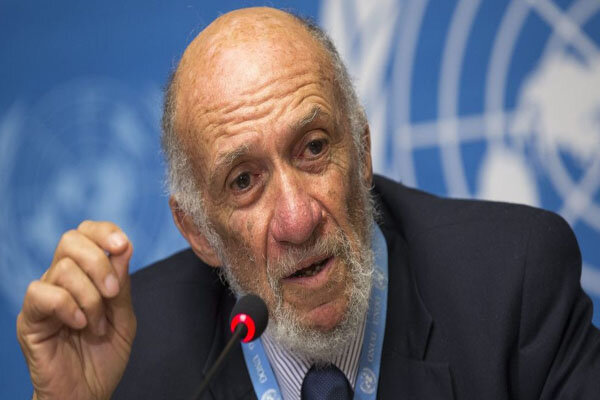Former United Nations High Commissioner for Human Rights says “The US refusal to lift sanctions, even temporarily or partially, reflects Trump’s overall transactional approach to the conduct of American foreign policy, which means in practice no shift in sanctions policy unless the sanctioned country is prepared to make some kind of equivalent policy concession of its own.”
Following is the full text of the interview:
US sanctions against Iran have hampered humanitarian trade with Iran, and the United States has refused to lift the sanctions in the critical circumstances of the COVID-19 pandemic. What are the reasons for this?
The US refusal to lift sanctions, even temporarily or partially, reflects Trump’s overall transactional approach to the conduct of American foreign policy, which means in practice no shift in sanctions policy unless the sanctioned country is prepared to make some kind of equivalent policy concession of its own. In Iran’s case, if Trump sticks to this approach, it would require Iran to end alleged roles in Syria, and the support it supposedly give to Gaza, Hezbollah, and the Houthi uprising in Yemen. Of course, this kind of transactional logic is particularly outrageous when it relies on the imposition of unilateral sanctions, that is, not authorized by the UN Security Council, is by itself unlawful and immoral, and indeed what I call ‘a geopolitical crime,’ that is, a deliberate diplomatic or foreign policy decision to engage in unlawful conduct violating the basic principles of the UN Charter. In this instance, sanctions operate, as has been observed in relation to the punitive sanctions imposed on Iraq after the Gulf War of 1991, as a ‘weapon of mass destruction.’
A secondary argument is that sanctions are a lesser evil than war or intervention, and these would be the policy alternatives given the hostility of the US Government toward Iran ever since the Islamic Republic was established in 1979. Israel has used its influence in Washington over the decades to keep this hostility alive. Israel deeply opposed the moves by the Obama presidency to normalize relations with Iran as reaching its climax by reaching an agreement in 2015 on Iran’s nuclear program (JCPOA). Trump made it a priority to attack the JCPOA agreement, and withdrew the United States as a participant as a prelude to the ‘maximum pressure’ approach.
Although some states and groups within the US have called on the Trump administration to lift sanctions on Iran in the current situation, he has not. Trump appears to be using the Corona virus to campaign for a maximum pressure policy against Iran. What is your opinion?
There is some pressure, but so far exclusively from Democrats in Congress and individual critics like myself, to suspend or relax the sanctions during this health crisis, given their deadly impact on Iran, actually heightened by the shocking intensification of sanctions. As indicated in my response to the prior question, this behavior on the part of Trump is consistent with his overall transactional approach, which among other flaws, lacks empathy for completely innocent civilian victims of the policy. Your question also calls attention to the maximum pressure policy that is directed solely at Iran, and is not explicitly invoked in relation to such other targeted countries such as Syria, Cuba, Zimbabwe, and Venezuela.
Although the Swiss channel was announced for humanitarian trade with Iran, it was not possible to transfer money from other countries to the channel because of US sanctions, and in practice the channel was not sufficient to meet its medical and other needs. It does not have humanitarian resources in Iran. Why aren't the US and European countries willing to consider an independent financial channel for humanitarian trade in Iran that could transfer money from other countries to it?
It is disturbing that other countries are not prepared to create an effective channel for assuring the flow of humanitarian resources to Iran in this period of emergency, especially given the failure of the UN System to provide humanitarian relief to the countries being targeted by unlawful sanctions. As previously explained, the US Government gives priority to its strategic goals even when the humanitarian costs of doing so are very high as at present. The European governments, despite being generally unhappy about the Trump approach, continue their bad habits formed during the Cold War of unconditionally accepting American foreign policy leadership, and to this day remain reluctant to oppose Trump even when disagreeing.
US sanctions have aggravated the suffering caused by Coronavirus challenge being experienced in Iran. What is the duty of the international community to put pressure on America in these circumstances?
This question raises an important issue calling attention to the weakness of the international community in situations where a leading state, the most influential Permanent Member of the UN Security Council, is the source of wrongdoing. At the UN, the US veto insulates its behavior from any serious challenge, and illustrates the subordination of international law in relation to the primacy of geopolitics. In this instance, there is no effective leverage that can be mobilized to achieve a suspension of sanctions against Iran other than international public opinion. Since the pandemic is preoccupying almost all countries with their own challenges, it is not likely that these governments or their populations possess the political will needed to circumvent the impact of sanctions on Iran.
Interview by Javad Heirannia

























Your Comment